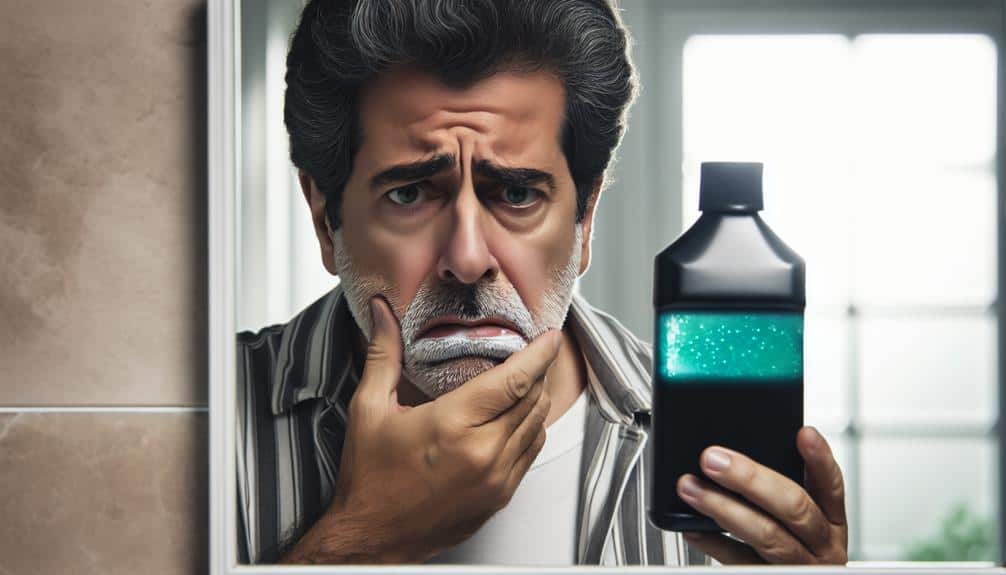To minimize teeth whitening risks effectively, you should prioritize understanding teeth sensitivity, which can be managed by using desensitizing toothpaste and avoiding extreme temperatures. Opt for professional supervision to guarantee personalized care and safer products. Following recommended usage instructions strictly, including amount and timing, is crucial for best results. Consider natural whitening alternatives like baking soda paste, but remember they may take longer to work. Finally, monitor your oral health post-treatment closely, keeping up with regular dental checkups. Staying informed about these strategies guarantees a successful and safe whitening experience.
Key Points
- Choose professional supervision for tailored treatment and risk minimization.
- Follow recommended product instructions to prevent sensitivity and damage.
- Consider natural whitening alternatives for gentler results.
- Monitor oral health post-treatment for lasting benefits.
- Use desensitizing toothpaste and avoid hot/cold foods to manage discomfort.
Understanding Teeth Sensitivity
To mitigate the risks associated with teeth whitening, it's important to understand the common issue of teeth sensitivity. Preventing enamel damage and managing discomfort are key aspects of this process. Teeth sensitivity is a common side effect of teeth whitening procedures, especially those that use potent bleaching agents. The sensitivity occurs when the peroxide in the whitening agent penetrates the enamel and irritates the nerve endings in the teeth.
When it comes to preventing enamel damage during teeth whitening, it's essential to follow the instructions provided by your dentist or the product manufacturer. Overusing whitening products or using products with high levels of bleaching agents can weaken the enamel and lead to increased sensitivity. It's recommended to use whitening products in moderation and to consult with a dental professional before starting any whitening treatment.
Managing discomfort caused by teeth sensitivity can be achieved by using desensitizing toothpaste or gel. These products help to block the nerve endings in the teeth, reducing the sensation of pain or discomfort. Additionally, avoiding hot or cold foods and drinks immediately after whitening treatments can help alleviate sensitivity.
Choosing Professional Supervision
Professional oversight is essential when considering teeth whitening procedures to guarantee safety and effectiveness. Seeking professional guidance ensures that the treatment is tailored to your specific needs and helps minimize potential risks. Dentists can assess your oral health before starting the whitening process, identifying any underlying issues that could affect the treatment.
Regular check-ups during and after the procedure are vital to monitor progress and address any concerns promptly.
Professional supervision also means that the whitening products used are of high quality and safe for your teeth and gums. Dentists have access to professional-grade whitening agents that are more effective than over-the-counter products while being less likely to cause sensitivity or damage. They can provide personalized recommendations on the best whitening method based on your dental history and goals.
Following Recommended Usage Instructions
Following the guidance on recommended usage instructions is key to maximizing the benefits and minimizing risks associated with teeth whitening procedures. Proper application and a consistent routine are essential for achieving the best results. Here are four essential tips to make sure you're following the recommended usage instructions correctly:
- Read the Instructions: Before starting the whitening process, carefully read the instructions provided by the manufacturer. Understanding the recommended usage guidelines will help you avoid potential pitfalls.
- Use the Recommended Amount: Applying the right amount of whitening product is important. Using more than instructed won't speed up the process and can lead to sensitivity or damage to your teeth and gums.
- Follow the Timing: Stick to the recommended time frame for each whitening session. Leaving the product on for longer than advised can harm your teeth and may not improve the whitening outcome.
- Maintain a Consistent Routine: Consistency is key to achieving and maintaining a brighter smile. Follow the usage instructions consistently to ensure the best results without compromising your dental health.
Opting for Natural Whitening Alternatives
Consider exploring natural whitening alternatives as a gentle and chemical-free option for enhancing the brightness of your smile. DIY remedies and home treatments offer a more natural approach to teeth whitening that may be appealing to those looking to avoid harsh chemicals often found in commercial products.
One popular DIY remedy is baking soda mixed with a small amount of water to form a paste. Gently brush this paste onto your teeth, as baking soda is known for its mild abrasive properties that can help remove surface stains. Another option is oil pulling, where swishing coconut or sesame oil in your mouth for a few minutes each day may help reduce bacteria and plaque buildup, contributing to a brighter smile over time.
These natural alternatives can be effective in maintaining a whiter smile without the potential risks associated with some commercial whitening products. However, remember that natural remedies may take longer to show results and may not be as potent as professional treatments.
Monitoring Oral Health Post-Treatment
To maintain peak oral health after undergoing teeth whitening treatment, it's essential to observe any changes in sensitivity or discomfort in your teeth and gums. Aftercare plays an important role in ensuring the success of the whitening procedure and preventing potential risks.
Here are key steps to monitor your oral health post-treatment:
- Schedule Post-Treatment Checkups: Regular dental checkups are essential to assess the impact of the whitening treatment on your oral health and address any emerging issues promptly.
- Monitor Tooth Sensitivity: Keep track of any increased sensitivity to hot, cold, or sweet stimuli, as this could indicate underlying problems that need attention.
- Maintain Good Oral Hygiene: Brush and floss regularly to prevent plaque buildup and maintain the results of your whitening treatment.
- Seek Professional Advice: Consult your dentist if you experience persistent discomfort or changes in your oral health post-treatment for appropriate guidance and care.
Frequently Asked Questions
Can Teeth Whitening Cause Permanent Damage to Tooth Enamel?
Teeth whitening can potentially cause permanent damage to tooth enamel, leading to issues like tooth sensitivity and enamel erosion. It's essential to follow proper guidelines and consult with a dental professional to minimize these risks.
Are There Any Long-Term Effects of Using Whitening Products?
When using teeth whitening products, it's essential to contemplate the long-term effects and potential risks. Safety concerns include enamel damage and gum irritation. Prioritize your oral health by consulting a dentist before embarking on any whitening regimen.
Can Certain Medications or Health Conditions Affect the Safety of Teeth Whitening Treatments?
Certain medications and health conditions can impact the safety of teeth whitening treatments. Consult your healthcare provider before undergoing whitening if you have concerns about how your medications or conditions may affect the process.
How Can I Determine the Best Whitening Method for My Individual Needs?
To determine the best whitening method for your needs, consider a customized treatment plan that addresses your specific concerns. Also, prioritize sensitivity management by using desensitizing products or opting for professional whitening under dental supervision.
Is It Possible to Over-Whiten Teeth and What Are the Risks Associated With This?
You can indeed over-whiten your teeth, causing sensitivity and enamel damage. Practice moderation, follow recommended guidelines, and consult your dentist for personalized advice. Prioritize sensitivity management and adhere to maintenance tips for best oral health.



